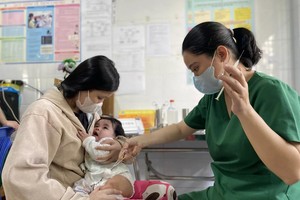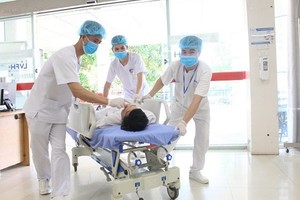Following the discovery last month of fake drugs in 10 Viet-France Pharmaceuticals Company warehouses, SGGP reporters have unearthed more information on illegal drug-selling practices in Ho Chi Minh City.

To Hien Thanh Street in the city’s District 10 is well known for its wholesale pharmaceutical markets. Some enterprises on the street refused to purchase medicines with unclear origins, but other dubious traders are known to sell nearly expired drugs at half the original price.
Demand for the drug Viagra, used for the treatment of erectile dysfunction, has recently skyrocketed, as have prices for the medicine.
Four blister packs of the drug cost VND700,000 in the mainstream market, but fake varieties are sold rampantly to pharmacies by illegal drug traders for only around VND200,000. The phony drugs are then resold to unknowing customers.
In addition, unscrupulous pharmaceutical company representatives can earn profits from selling their company’s drug samples, which are normally offered to doctors for free.
Such companies are not permitted to sell their medicine samples, but some employees with access to the drugs have been found reselling them cheaply, without receipts or proof of origin, to local pharmacies.
Independent, illegal drug traders also work throughout the city. One trader named Tuan was found to have purchased a large quantity of the drug Sagacef 200, manufactured by Saga Laboratories of India and imported by Pharbaco Central Pharmaceutical JSC No.1.
The medicine has been banned in Vietnam, however, for failing to meet Vietnamese safety and quality standards, and the Ministry of Health ordered the importer to withdraw the medicine from the local market.
Some fake-drug traders also find ways to remake and sell expired and prohibited medicines to pharmacies and private clinics at high prices.
Local police last month discovered a large quantity of fake medicines and production equipment including stamping machines and a device to make drug capsules. The paraphernalia, stored in 10 warehouses on Ly Thuong Kiet Street in District 10, allegedly belonged to Huynh Van Quang, director of the Viet-France Pharmaceuticals Company JCC.
Quang reportedly purchased cheap, domestically made medicines and then placed the drugs in brand-name containers including Novartis, Roche, Gedeon Richter, Janssen Cilag and Solvay to resell at higher prices.
Last month, HCMC Market Managers also discovered 2,000 containers of expired drugs in a warehouse belonging to Dong Phuong (Oriental) Pharmaceutical Ltd. Company in District 1. The company was found illegally applying new expiry dates to the drugs.
According to the HCMC Market Management Board, over 10 major cases were unearthed in 2009 involving local pharmacies selling fake or expired drugs. In addition, many more were found selling drugs without clear origins or receipts.
Each Vietnamese citizen spends around US$16.40 on drugs annually, and could be putting their health at great risk when purchasing medicines of unknown origin and safety.
























